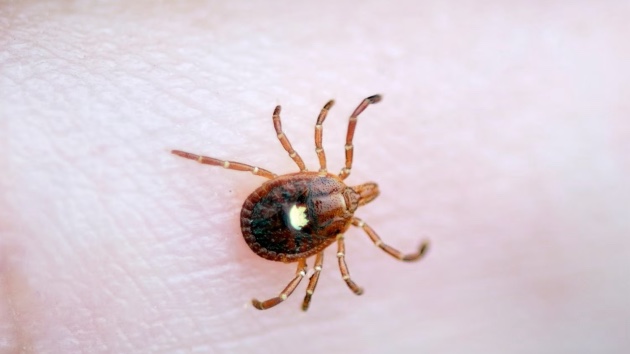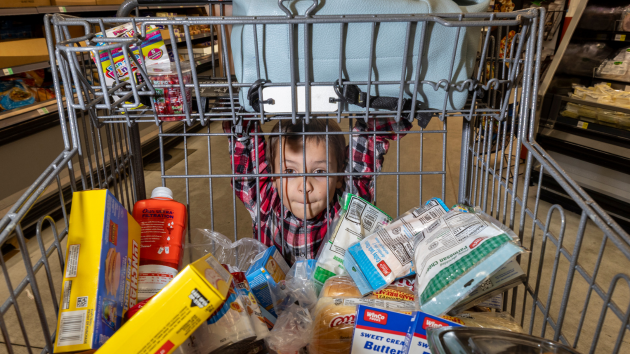Husband speaks out about postpartum depression after wife dies by suicide
Written by ABC Audio ALL RIGHTS RESERVED on June 12, 2023

(NEW YORK) — Ariana Sutton was a dance instructor and mom of three whom friends describe as “warm” and “upbeat,” and who loved being a mom, according to her husband Tyler Sutton.
On May 22, Ariana Sutton, 36, gave birth to newborn twins Everly Irene and Rowan Stephen, who joined the couple’s older daughter, 4-year-old Melody.
Just nine days later, on May 31, Ariana Sutton died by suicide.
Now Tyler Sutton is speaking out to call for change when it comes to the condition that he said led to his wife’s death, postpartum depression.
“It takes a very strong person to ask for help,” Tyler Sutton told ” Good Morning America.” “If we could just make it the norm asking for help, instead of [women] feeling shame for not being able to do it themselves, because this is a real thing. It is very, very real, very powerful, very dangerous, and shouldn’t be faced [alone].”
Tyler Sutton, a police officer in Massachusetts, said his wife did not experience mental health issues prior to giving birth to their first child.
After delivering Melody in 2018, he said his wife experienced a “very serious case” of postpartum depression, which can be an intense and sometimes longer-lasting depression that occurs after having a baby, according to the U.S. Centers for Disease Control and Prevention.
“We weren’t that familiar with it, so we were very much in the dark, both of us,” Tyler Sutton said, referring to postpartum depression. “As it got worse, we didn’t have any organizations to reach out to. We didn’t have anything lined up because we didn’t know what we were dealing with.”
Tyler Sutton said he noticed changes in his wife’s personality, but since he didn’t know much about the condition, his first instinct was “just to chalk it up to being a new mom.” Then, he said he saw in his wife a problem that needed professional, medical help.
“I came home [from work] one morning and I just couldn’t recognize the person sitting in front of me,” he said. “So we dropped my daughter off with her grandmother and got her to the hospital where they said it was postpartum depression.”
Tyler Sutton said that after two different hospitalizations, Ariana Sutton began to return to her old self thanks to the right combination of medications and a mental health professional.
“Thinking back on it … we dropped the ball many times and we fumbled a lot and were just lucky enough to pick it back up, when it shouldn’t be that way,” he said. “It shouldn’t have it shouldn’t have taken us that long to get her home the first time.”
When the Suttons decided to grow their family again, Tyler Sutton said it was a decision that was made very thoughtfully, and was the reason they waited four years after Melody’s birth.
“When we finally got pregnant with the twins, we came up with a plan,” he said. “We got a team together — a psychiatrist that we had known for four years and a therapist that she continued to speak with for all those four years, because she was always in fear that it would return.”
After a healthy pregnancy, Ariana Sutton went into labor with the twins around three weeks before a planned induction. While she was discharged from the hospital a few days after giving birth, the twins remained in the hospital’s neonatal intensive care unit.
Tyler Sutton said the twins’ premature birth was a “big trigger” for Ariana Sutton, whom he said began to suffer from postpartum depression much sooner than she had after the birth of their first child.
“What happened to her over the span of a few weeks happened this time around within a couple of days,” Tyler Sutton said. “And even though we had a plan in place, there was no way for us to predict that this would happen so quickly and so suddenly. It just came out of nowhere and we weren’t ready.”
Raising awareness of postpartum depression
Tyler Sutton said that, following his wife’s death, he now plans to spend the rest of his life raising awareness about postpartum depression, a condition that affects as many as 1 in 8 women who give birth, according to the CDC.
He said he wants to create change as a legacy to Ariana Sutton and their children, noting, “Hopefully by the time they’re old enough to have children, there’ll be a better system put in place for them.”
Describing how he wants their kids to remember their mother, he added, “Postpartum depression was not really something that defined her, it was something that happened to her that can be avoided, that we just couldn’t get a hold of in time.”
Symptoms of postpartum depression include withdrawing from loved ones, crying more than usual, feeling worried or overly anxious, feeling anger, doubting your ability to take care of your baby and thinking about harming yourself or your baby, according to the CDC. The symptoms may last for weeks or months after giving birth, and are more intense and longer lasting than the “baby blues” that women may experience after giving birth.
Although a history of depression may increase the risk of postpartum depression, there is no single test that can diagnose postpartum depression, or predict whether or not a woman will suffer from it. It’s often up to women or their partners and family members to seek seek professional medical help if they are struggling after giving birth.
Part of the change Tyler Sutton said he wants to see is in how health care providers talk to expectant people about postpartum depression.
“If there was something that I could start right now, [it would be to] ask the medical community just to make a small change to their routine, and add one more line to their checklist of things to do when they meet with people,” he said. “When a pregnant person comes into their office for the first time and they’re very excited and they start to talk to them about the future and appointments and ways to prepare and things to look out for, at the very end, they should say, ‘We are going to be talking periodically about postpartum depression and the severity and different things you can do about it to prepare for the possibility.'”
He continued, “And every time they come in for an appointment, every time they go to see someone, every time they go in for an ultrasound, someone should be sitting there saying, ‘How are you feeling? Have you been feeling anxious or anything like that? We ask because we need you to be aware of the possibility of postpartum depression. You may not think it can happen to you, but you may not know until it’s too late, so let’s talk about it.'”
Tyler Sutton said he would also recommend that pregnant people be given the name and number of a social worker that they can save in their phone, and be encouraged to meet with a therapist during pregnancy so they have an established relationship to turn to in an emergency.
“When it was happening to us, we had no numbers. We had no names. We had no one to reach out to,” he said. “We just continuously had to rush to the hospital, sit in a waiting room and then sit in another room until finally someone came and said, ‘Yeah, you need to get her a therapist,’ and then I would have to take my phone out and start searching.”
According to the CDC, around 1 in 5 women surveyed in the U.S. were not asked about depression during a prenatal visit, and 1 in 8 were not asked during a postpartum visit. In addition, over half of pregnant women with depression do not receive treatment.
The CDC notes that the type of mental health care pregnant and postpartum women receive can depend on where they live. The agency says states should utilize programs that can help screen and treat women for depression, and calls on healthcare providers to “ask every pregnant and postpartum woman about symptoms of depression,” and know local resources for help.
Tyler Sutton said that as he mourns his wife, he is comforted by the fact that her story may end up helping other families, saying, “It gives me hope that that somewhere, someone will get the help that they need that they wouldn’t have a few days ago.”
He said that by speaking out himself, he also hopes it encourages more women to describe their own experiences with postpartum depression so more people know the signs.
He recalled that Ariana Sutton once described her experience with postpartum depression to him as if a “tiny person had taken up refuge in her head and would drown out all the positive things that people were trying to get through to her.”
“At the end of the day, I witnessed it from a viewer’s perspective, even though I was there firsthand. It can only take the conversation so far,” Tyler Sutton said. “If [Ariana] was here, she’d do a much better job describing what she what she was feeling. She was very articulate about everything, but unfortunately she’s not here to do that.”
For families coping with postpartum depression, Postpartum Support International offers a free and confidential helpline via call and text at 1-800-944-4PPD (4773). If you or someone you know is struggling with thoughts of suicide, call or text 988 or chat 988lifeline.org. Free, confidential help is available 24 hours a day, 7 days a week. You are not on your own.
Copyright © 2023, ABC Audio. All rights reserved.

 KVSP
KVSP 




